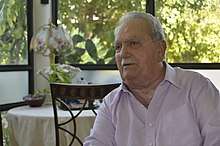Yehoshua Sagi
Yehoshua Sagi (Hebrew: יהושע שגיא, born 27 September 1933) is a former Israeli intelligence officer and politician. He was director of the Military Intelligence Directorate (1979-1983) a Knesset member for Likud (1988-1992) and mayor of the coastal city ofBat Yam.
| Yehoshua Sagi | |
|---|---|
 | |
| Date of birth | 17 September 1933 |
| Place of birth | Jerusalem, Mandatory Palestine |
| Knessets | 12 |
| Faction represented in Knesset | |
| 1988–1992 | Likud |
Biography
Yehoshua Sagi was born in Jerusalem during the Mandate era He attended a local high school and later earned a B.A. in history and international relations from Tel Aviv University.
Military career
Sagi entered the Israeli Defense Forces in 1951. From 1953 to 1954, he served in the Southern Command, fulfilling field duties. During the Suez Crisis in 1956, he served as intelligence officer of the Armored Corps and as commander of a reconnaissance unit. Following the 1956 war, he served as an intelligence officer with the 7th Brigade, and later as assistant intelligence officer. From 1967 until 1970, he was an intelligence officer in the Southern Command, and during the Yom Kippur War was a divisional intelligence officer.
In 1974 he became assistant to the head of research at the Military Intelligence Directorate. After serving as deputy head beginning in 1978, he rose to become head of Military Intelligence in 1979. During the leadup to the 1982 Lebanon War, Sagi was charged by Prime Minister Menachem Begin with obtaining some form of American approval for an Israeli ground invasion of Lebanon. The result was the admission by U.S. Secretary of State Alexander Haig that the infiltration of terrorists over any of Israel's borders constituted a violation of the July 1981 ceasefire, but not terrorist actions against Israeli or Jewish targets outside of the region.[1][2]
Saguy was asked to resign in 1983 following the recommendations of the Kahan Commission, which had determined that he was guilty of indifference during massacres at Palestinian refugee camps in Israeli-occupied Lebanon. Saguy subsequently resigned from the army.[3]
Political career
After leaving the IDF, he won a place on the Likud list for the 1988 elections, and won a seat in the Knesset. He served on the Finance Committee, the Foreign Affairs and Defense Committee and the Internal Affairs and Environment Committee, until losing his seat in the 1992 elections.
The following year, he became mayor of Bat Yam, a post he held until 2003.
References
- Schiff Ya'Ari; Ze'ev Schiff; Schiff/Ehud Ya'ari Ze'ev (3 June 1985). Israel's Lebanon War. Simon and Schuster. pp. 67–. ISBN 978-0-671-60216-1.
- Maoz, Zeev (2006). Defending the Holy Land. University of Michigan Press. p. 193. ISBN 0472115405.
- "Around the world; Israeli General Resigns From Army" The New York Times, 15 August 1983
- Central Intelligence Agency. "Israel. Foreign Intelligence and Security Services, 1979". Included in the volume "Documents from the US Espionage Den", Tehran, 1982.
External links
- Yehoshua Sagi on the Knesset website